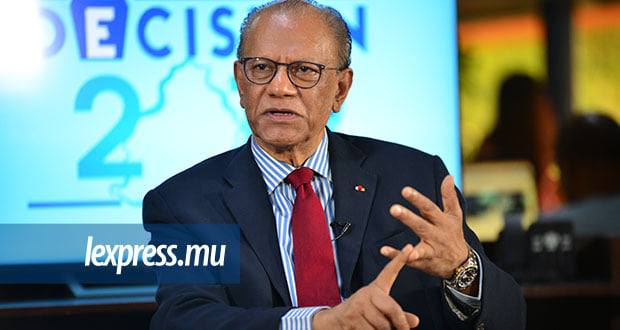Publicité
Foreign labour : Facts v/s Assumptions
Par
Partager cet article
Foreign labour : Facts v/s Assumptions

DEAR SIR,
It was with great pleasure that I have read the article entitled ‘Les INCOHERENCES du ministre du Travail’ written by Mr. Jean Mée DESVEAUX. It is not very often that we come across constructive criticism on issues of national interest. I may not always agree with everything Mr. Jean Mée Desveauxwrites, however, I appreciate his straight forward approach.
Nevertheless, I need to draw the attention of Mr. Desveaux and your readers to the following :
1. The decision to “freeze” the recruitment of foreign workers in the construction sector has nothing to do with the events that occurred at REAL GARMENTS LTD.
2. Several days before the events at REAL GARMENTS LTD, a meeting was held with the Vice Prime Minister and Minister of Finance and Economic Development and stakeholders of the construction industry. One of the aims was to find ways and means to encourage Mauritians to take up work within the construction industry.
3. That also meant to;
a. identify the scarcity areas within the sector;
b. Find out reasons that keep many Mauritians away from big construction companies and instead prefer to work informally within the sector;
c. Confirm information to the effect that Mauritian workers were being paid less when working for big constructions and earning more when sticking to the informal sector;
d. Assess information that foreign workers were being paid the minimum provided for in the relevant Remuneration Order (RO) as opposed to Mauritians who would rightfully expect more;
e. Once the scarcity areas identified provide appropriate training and placement to the local workforce with a view to widening the job opportunities.
4. I decided not to continue issuing permits in the construction industry while preparing for a new system. This will now enable us to use the time available until 15th October 2013 to hold consultations with all stakeholders in order to devise new policy options concerning issuing of work permits in the construction industry.
5. I am more than aware that foreign workers are essential to the construction industry as well as other sectors of our economy. However, I am duty bound to do everything within my power to at least try to widen the job opportunities for our citizens. This is in the national interest. It is only when we have done our level best to place the Mauritians at center stage of our economic development that we can safely afford to consider the foreign workers as a necessity.
6. In an attempt to give credence to his assumptions, the author has mixed the needs of foreign labour in the construction sector with that of the textile industry! He clearly believes that one size fi ts all. This is where we clearly differ. Let me underline that the measures taken in the construction sector do not in any way concern the manufacturing and export oriented enterprises. For example, the reasons that make a local stay away from the textile industry are not the same as the one keeping him away from the construction sector. The shift system being used in the sea food sector such as at Thondes Mascareignes is one of the reasons that keep local workers away from that sector and that cannot therefore be compared to the construction sector. I am in no way being confrontational when I underline the reluctance of the private sector to embrace new provisions of the law pertaining to night shift! Each sector face different realities. That is why it is imperative to allow each sector to flourish with its own requirements in relation to the need for foreign labour. I am once again not in any way against foreign labour. I am simply saying that it is only when Mauritians have been given all opportunities of training in scarcity areas that will in turn make them employable and we will reasonably be entitled to consider foreign labour.
7. When Mr. Jean Mee Desveaux writes ‘‘ il fait abstractiondu fait que les salairesque Real Garments payaitaux Bangladais jusqu’à débutaoût étaient bien la misère desRemuneration Orders, s’elevantà environ Rs 4 000…and ‘Que l’action industrielledu début du mois ait enfreint l’accord du 2 août qui octroie le nouveau salaire semble être un fait indéniable. Que ce soit equitable pour un employeur d’imposer 60 heures de travail pour une rémunération de Rs 8 500. Par mois nous renvoie à la case départ, soit que le salaire de base sans heures supplementaires demeure les Rs 4 000 du RO’’, he seemsnot to be aware of the provisionsof the EmploymentRelations Act of 2008.
8. As Minister I can only operate within legal parameters pursuant to the Employment Relations Act.
9. The Remuneration Orders for the Export Enterprises and the Factory Workers Remuneration Orders date back to 1984. Those two RO’s, are what determines the minimum prescribed salary and conditions of employment within the relevant sectors. Why is it that those two RO’s were never sent to the National Remuneration Board for a complete review ever since 1984? Has this not contributed to Mauritians fleeing the sector? Has this not also contributed to an increase in the dependency of those sectors on foreign labour? You will surely agree that there is a correlation between the two! I have on the 22nd October 2012 in accordance with section 91 of the Employment Relations Act referred the two RO’s to the National Remuneration Board for a complete review.
10. I have done so because I am not satisfied with the wages and conditions of employment prevailing in that sector.
11. In light of the above;
a.Can a Minister of Labour, Industrial Relations and Employment ask any person paying the minimum wage as prescribed by a RO to pay more?
The answer is no. I am, unfortunately, not legally entitled and empowered to do so.
b. How can a worker obtain more that the minimum prescribed wage?
The way forward is to engage in negotiations and/ or a “collective bargaining” mechanism.
c. Can a Minister of labour intervene in such a process?
The answer is no. I am not legally entitled or empowered to do so unless both parties call upon the Minister to intervene.
d.Can the Minister unilaterally get involved in the process of negotiations between the workers and employers even as regards the issue of overtime?
Theanswer is no.
12. In the case of REAL GARMENTS LTD, neither was I nor was any officer of my Ministry ever called upon by both parties to intervene or help in the negotiations process between worker and employer, which led to the agreement of the 2nd of August 2013. It would therefore have been unlawful for a Minister to intervene unilaterally in those negotiations. Had I done so, I would have been in violation of the law of the land and international conventions of the International Labour Organisation (ILO). The ideas you put forward in the article are therefore based on totally wrong premises.
13. As regards the Decent Work Country Programme, I have requested the ILO to provide us with experts to advise on the merits of a National Minimum Wage Policy. Moreover, the National Tripartite Forum will soon be called upon to engage into full-fl edged discussions on this issue, which I hold very dearly. In the mean time I am obliged to operate within the parameters of the law even though Mr. Jean Mée Desvaux seems to be of the view that to do otherwise is acceptable.
14. I thank Mr. Jean Mée Desvaux for providing me with a defense for my alleged “erreur de jeunesse”. I take it as a compliment. I only wish I could reciprocate by providing him with a defence. I unfortunately cannot because his experience knowledge and “age” make him duty bound to base his reasoning on facts as opposed to assumptions. Now that the author is in presence of facts, I humbly invite him to revisit his conclusions. As for me, I look forward to more such articles as that of the author Mr. Jean Mée Desvaux. Such views can surely contribute positively to the construction of our nation.
15. I am 45 years old. Proud to have been born in 1968, the year we obtained our freedom. Mauritian brains, heart and sweat have forged our economic success. I believe in the ingenuity of our people. I want our people to believe in themselves. Belief in our ability as a nation will make us masters of our destiny. Our human capital is our only natural resource that holds the key to the future we all would like our children to live in.
▬▬▬▬▬▬▬▬▬▬▬▬▬▬▬▬▬▬▬▬▬▬▬▬▬▬▬▬▬▬▬▬▬▬▬▬▬▬▬▬▬▬▬▬
OUR REPLY
by Jean Mée DESVEAUX
We have no doubt that the reader will appreciate Minister Shakeel Mohamed’s paper “Facts v/s Assumptions”. We thank him heartily for his courtesy and for this contribution in enlightening the Mauritian public and employers alike on a move which has so far shocked a myriad of employers’ organisations in the local construction industry. It stands to reason that if Mr. Mohamed’s explanation had preceded his new initiatives rather than the reverse, he would not have needed this damage-control exercise.
I kindly draw the Minister’s attention to the fact that I am not guilty of the first point he criticises me for. Unlike several other commentators in the media, I have drawn no causal relationship whatsoever between the REAL GARMENTS incident and his introduction of the foreign labour restriction in the construction industry. L’express was aware of the meeting he had held with employers in the construction industry. It is interesting to note, by the by, that we have had the opportunity to meet some of the employers present at that meeting who declared themselves rather surprised by the Minister’s subsequent knee jerk reaction regarding foreign workers.
All Minister Mohamed’s points from 2 to 5 are cogent and perfectly acceptable.
Relative to point no 6): I have made no assumptions in the paper. And I certainly didn’t need the one Mr. Mohamed attributes to me. My method was a very simple one of bringing to light various statements from the same Minister which, having been uttered at different times and in different circumstances, do not, unfortunately for him, agree with each other. I have not been accused of misquotation.
In the Minister’s interview in Weekly that I quoted, Mr. Mohamed puts the Thon desMascareignes on a par with the construction industry regarding these sectors’ difficulty in attracting local manpower. And that quote is quite graphic. No criticism of misquotation here either. I didn’t draw that parallel between sectors, he did.
We cannot but agree with the Minister that we should use all our labour force before employing people from other climes. He cannot be criticised for that. Wouldn’t the Minister however acknowledge that you can bring a horse to water but you can’t make him drink! The local workers snub the construction industry, as he has himself often reiterated, and if Mr. Mohamed solves that problem in three months’ time, we promise to declare him a nonpareil in our columns.
Point 7 and 8 are quite interesting. The Minister says that in spite of the equity argument which he totally agrees with, he can only abide by the parameters of the law. We understand that. It is unfortunate that the Minister does not quite apprehend that the image he conveyed in the midst of the REAL GARMENTS foray was not that of a reluctant supporter but that of an ardent adherent full of gusto in the conviction of his cause. May we attribute that one to his youthful enthusiasm overtaking his collected self again?
Point No 9 is a piece of welcome news which all Mauritians will be relieved to learn. Why hasn’t the Minister’s communication cell deemed it proper to disseminate such important information much before the stuff hit the fan?
Having received the information from the Minister’s paper and seeing no challenge to the veracity of the mutually exclusive quotations, I cannot but fear that Mr. Mohamed has a mild to severe form of foot-in-mouth disease. This prognostic is not as severe as it sounds in view of the age of the patient who will one day, like Andrew Marvell, be able to say “but at my back Ialwaies hear, time’s wingéd chariothurrying near”.
Publicité
Les plus récents






